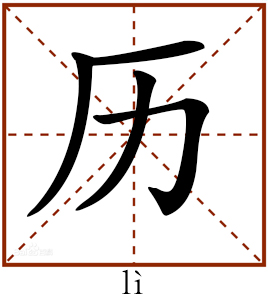Calendar

This character often appears in the word li shi, known as history. When used as a verb, it means “to experience or go through.” When used as a noun, it often refers to a calendar.
晴川历历汉阳树
qíng chuān lì lì hàn yáng shù
Qing usually means fine weather and chuan refers to rivers. Li li means “to be clear to see” and shu refers to trees. Hanyang is a district located on the northern bank of the Han River in present-day Wuhan, Hubei Province. This term poetically depicts how trees on the bank of a sunlit river can be clearly distinguished one by one.
This term originated from the poem “Yellow Crane Tower” by the Tang poet Cui Hao (704–754). “Long ago someone rode away on a yellow crane;/ All that’s left here, pointlessly, is Yellow Crane Tower./ Once a yellow crane has gone it won’t come back again—/ The white clouds will be empty, endless, for a thousand years./ Across the river in the sun are the trees of Hanyang in rows./ And scented grass on Parrot Island growing thick and lush./ But whereabout is my home village, in the evening light?/ Seeing the misty waves on the river I grow disconsolate” (trans. Peter Harris). Yellow Crane Tower is a traditional Chinese tower located in Wuhan. The current structure was built in 1981, but the tower has existed in various forms from as early as the year 223. A legend tells of a man named Fei Yi who becomes immortal and rides a yellow crane, stopping in the tower to take a rest.
The poem starts with Cui’s imagination of Fei Yi riding away on a yellow crane. Some believe that the yellow crane which won’t return symbolizes the passing of time, while the endless clouds indicate that worldly affairs never stop. In the last half of the poem, the sunset stirs Cui’s homesickness. The misty waves on the river create an air of nostalgia.
This poem is often praised as the best of the Tang Dynasty qiyan lüshi (an eight-line poem form with seven characters to a line and a strict tonal pattern and rhyme scheme). It is said that the great poet Li Bai once wanted to make a poem inspired by what he saw in the Yellow Crane Tower. After he read Cui’s poem, however, he gave up and said that he enjoyed the view but couldn’t come up with a poem as brilliant as Cui’s.
edited by REN GUANHONG
